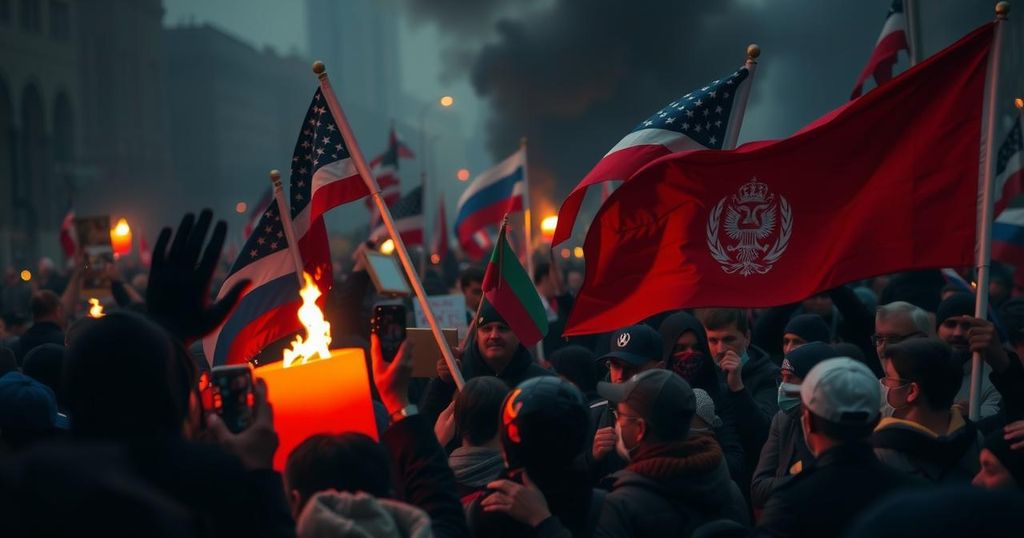Intelligence Officials Warn of Potential Foreign Instigation of Violence in U.S. Post-Election Protests
Intelligence officials have warned that Russia and Iran may attempt to provoke violent protests in the U.S. post-election, with strategies including covert organization or support of domestic groups. The warning highlights a greater risk of political violence this year, particularly following the Capitol attack on January 6, 2021. Civil rights organizations are promoting voter engagement and resilience against disinformation, while acknowledging the need for vigilance against foreign interference in the electoral process.
Senior intelligence officials have issued a warning that foreign adversaries, specifically Russia and Iran, may seek to instigate violent protests in the United States following the upcoming election. This alert was detailed in a declassified memo released by the Office of the Director of National Intelligence, which highlights prior instances of foreign entities attempting to exacerbate domestic discord in relation to the electoral process. The memo indicates that these nations could either covertly orchestrate protests or incite participation in events organized by domestic groups with the intent of fostering division and undermining confidence in the electoral outcome. Notably, intelligence reports reveal that in January, Russian military intelligence attempted to recruit an American citizen for the organization of protests within the U.S., with the individual reportedly unaware of their interaction with Russian operatives. Additionally, Iran has been accused of providing covert assistance in anti-American protests, including financing attendance at rallies opposing U.S. support for Israel amid the recent conflict in Gaza. The likelihood of political violence instigated by foreign adversaries post-election is perceived to be elevated this year. Intelligence assessments suggest that both countries possess enhanced knowledge of the U.S. electoral certification process, a concern heightened by the January 6, 2021, attack on the Capitol, which demonstrated how misinformation can incite violent events. The period following Election Day until the inauguration poses particular risks, with the potential for both international actors and domestic extremist groups to exploit rumors and minor irregularities to disrupt the certification process. Moreover, there exists apprehension regarding the exploitation of threats of violence at polling locations, aimed at deterring specific voter demographics. The response from various election advocacy organizations to this threat has been proactive, focusing on mitigating disinformation and reinforcing the importance of voter engagement. In their efforts, organizations are emphasizing that the power to determine election outcomes rests with the voters and not with political factions or manipulative entities. Prominent civil rights advocates have highlighted the necessity for a resilient democracy that endures despite polarizing circumstances. Despite assertions by Russia, Iran, and China denying any attempts to meddle with the U.S. electoral process, concerns persist regarding foreign influence. In light of these developments, it is paramount for the public and electoral officials to remain vigilant against disinformation and politically motivated attempts at sowing discord amid an already fractious political landscape.
The warning from U.S. intelligence regarding potential foreign interference in domestic election protests is grounded in ongoing geopolitical tensions. Russia and Iran have behaved as adversaries to U.S. interests in various contexts, and their involvement in similar efforts to instigate unrest has been documented in past elections. Intelligence experts are particularly concerned about the implications of disinformation tactics, which can rapidly translate into real-world violence, thereby undermining public trust in democratic institutions. Moreover, following the events of January 6, 2021, the threat landscape has evolved, highlighting vulnerabilities in the electoral process that may be targeted by external actors.
In conclusion, the potential for violent protests in the United States instigated by foreign adversaries like Russia and Iran necessitates a heightened awareness and proactive measures to protect the electoral process. The recent declassified intelligence reflects serious concerns about the intersection of foreign interference and domestic political polarization. Fortunately, various organizations are working to counter disinformation and encourage civic participation to safeguard democracy amidst these challenges.
Original Source: apnews.com




Post Comment